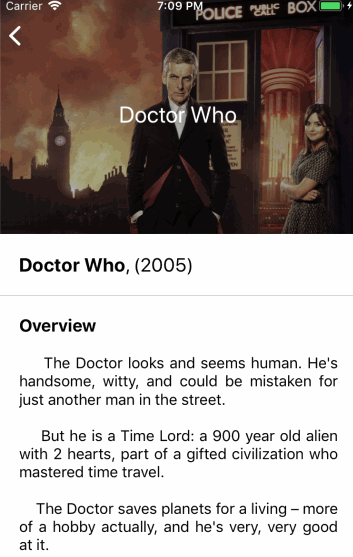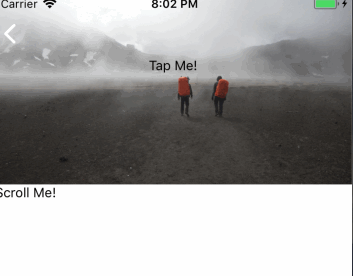A ScrollView-like component that:
- Has a fixed image header
- Keep the image as a nav bar
- Works on iOS and Android
$ npm install react-native-image-header-scroll-view --save
You can find this example code here : https://github.com/bamlab/react-native-image-header-scroll-view-example/blob/master/src/Pages/TvShow.js
import HeaderImageScrollView, { TriggeringView } from 'react-native-image-header-scroll-view';
// Inside of a component's render() method:
render() {
return (
<HeaderImageScrollView
maxHeight={200}
minHeight={MIN_HEIGHT}
headerImage={require("../../assets/NZ.jpg")}
renderForeground={() => (
<View style={{ height: 150, justifyContent: "center", alignItems: "center" }} >
<TouchableOpacity onPress={() => console.log("tap!!")}>
<Text style={{ backgroundColor: "transparent" }}>Tap Me!</Text>
</TouchableOpacity>
</View>
)}
>
<View style={{ height: 1000 }}>
<TriggeringView onHide={() => console.log("text hidden")}>
<Text>Scroll Me!</Text>
</TriggeringView>
</View>
</HeaderImageScrollView>
);
}Result :
You can find examples in a dedicated repository.
All of the properties of ScrollView are supported. Please refer to the
ScrollView documentation for more detail.
The HeaderImageScrollView handle also the following props. None is required :
| Property | Type | Default | Description | Example |
|---|---|---|---|---|
renderHeader |
function |
Empty view | Function which return the component to use as header. It can return background image for example. | example |
headerImage |
Image source Props (object or number) | undefined |
Shortcut for renderHeader={() => <Image source={this.props.headerImage} style={{ height: this.props.maxHeight, width: Dimensions.get('window').width }} />} |
example |
maxHeight |
number |
80 |
Max height for the header | example |
minHeight |
number |
125 |
Min height for the header (in navbar mode) | example |
minOverlayOpacity |
number |
0 |
Opacity of a black overlay on the header before any scroll | example |
maxOverlayOpacity |
number |
0.3 |
Opacity of a black overlay on the header when in navbar mode | example |
overlayColor |
string |
black |
Color of the overlay on the header | example |
useNativeDriver |
boolean |
false |
Use native driver for the animation for performance improvement. A few props are unsupported at the moment if useNativeDriver=true (onScroll, ScrollComponent, renderTouchableFixedForeground) |
- |
headerContainerStyle |
Object |
undefined |
Optional styles to be passed to the container of the header component | |
disableHeaderGrow |
boolean |
undefined |
Disable to grow effect on the header |
| Property | Type | Default | Description | Example |
|---|---|---|---|---|
renderForeground |
function |
Empty view | Function which return the component to use at foreground. The component is render in front of the header and scroll with the ScrollView. It can return a title for example. | example |
renderFixedForeground |
function |
Empty view | Function which return the component to use as fixed foreground. The component is displayed with the header but not affected by the overlay. | example |
foregroundExtrapolate |
string |
clamp |
Optional prop that allows override extrapolate mode for foreground. Use null to allow extrapolation, which is usefull for using foreground as bottom title |
- |
foregroundParallaxRatio |
number |
1 |
Ration for parallax effect of foreground when scrolling. If 2, the header goes up two times faster than the scroll | example |
fadeOutForeground |
bool |
false |
If set, add a fade out effect on the foreground when scroll up | example |
renderTouchableFixedForeground |
function |
Empty view | Same as renderFixedForeground but allow to use touchable in it. Can cause performances issues on Android |
example |
fixedForegroundContainerStyles |
Object |
undefined |
Optional styles to be passed to the container of the fixed foreground component |
| Property | Type | Default | Description | Example |
|---|---|---|---|---|
ScrollViewComponent |
Component |
ScrollView |
The component to be used for scrolling. Can be any component with an onScroll props (ie. ListView, FlatList, SectionList or ScrollView) |
example |
scrollViewBackgroundColor |
string |
white |
Background color of the scrollView content | example |
The module also export a TriggeringView component. It is a spy View you put on the page that will can call various callback during the scroll. It accept callback called when it disappear or appear at the top of the ImageHeaderScrollView. You can see an exemple in the dedicated repository.
All of the properties of View are supported.
| Property | Type | Description |
|---|---|---|
onBeginHidden |
function |
Called when the component start to be hidden at the top of the scroll view. |
onHide |
function |
Called when the component is not displayed any more after scroll up |
onBeginDisplayed |
function |
Called when the component begin to be displayed again after scroll down |
onDisplay |
function |
Called when the component finished to be displayed again. |
onTouchTop |
function |
Called when the Top of the component touch the Top of the ScrollView. (onDisplay + onBeginHidden) |
onTouchBottom |
function |
Called when the Bottom of the component touch the Top of the ScrollView. (onHide + onBeginDisplayed) |
Just set the maxOverlayOpacity to 0.
<HeaderImageScrollView
minOverlayOpacity={0}
maxOverlayOpacity={0}
{/* ... */}
/>You have two solutions :
- You can use the
disableHeaderGrowprops. It will keep the ios elastic scroll effect. - You can also use the
bounces={false}props from the scroll view.
Results :
disableHeaderGrow |
bounces={false} |
|---|---|
 |
 |
All contributions are welcomed, that might be either adding new features, doing some refaco of the exisiting code or fixing bugs.
How to contribute
- Fork the project & clone locally. Follow the initial setup here.
- Create a branch, naming it either a feature or bug: git checkout -b feature/that-new-feature or bug/fixing-that-bug
- Code and commit your changes. Write a good commit message. Best would be to use git commitizen
- Test your changes in the example repository
- Push to the branch: git push origin feature/that-new-feature
- Create a pull request for your branch 🎉


